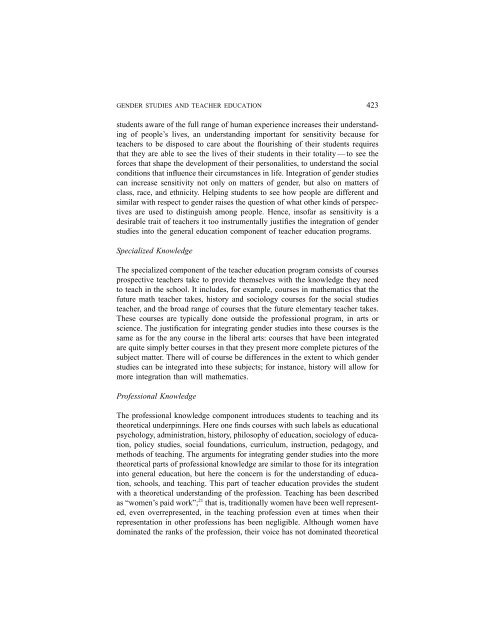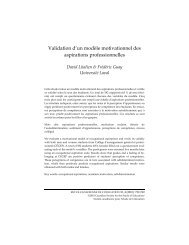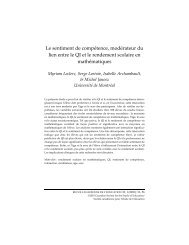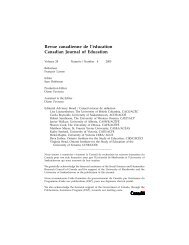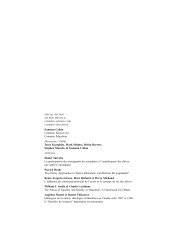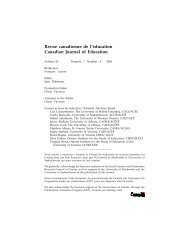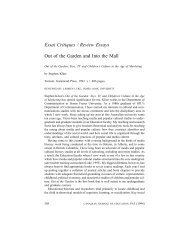Mireille Falardeau et Michel Loranger Le choix de stratégies ... - CSSE
Mireille Falardeau et Michel Loranger Le choix de stratégies ... - CSSE
Mireille Falardeau et Michel Loranger Le choix de stratégies ... - CSSE
Create successful ePaper yourself
Turn your PDF publications into a flip-book with our unique Google optimized e-Paper software.
GENDER STUDIES AND TEACHER EDUCATION 423<br />
stu<strong>de</strong>nts aware of the full range of human experience increases their un<strong>de</strong>rstanding<br />
of people’s lives, an un<strong>de</strong>rstanding important for sensitivity because for<br />
teachers to be disposed to care about the flourishing of their stu<strong>de</strong>nts requires<br />
that they are able to see the lives of their stu<strong>de</strong>nts in their totality — to see the<br />
forces that shape the <strong>de</strong>velopment of their personalities, to un<strong>de</strong>rstand the social<br />
conditions that influence their circumstances in life. Integration of gen<strong>de</strong>r studies<br />
can increase sensitivity not only on matters of gen<strong>de</strong>r, but also on matters of<br />
class, race, and <strong>et</strong>hnicity. Helping stu<strong>de</strong>nts to see how people are different and<br />
similar with respect to gen<strong>de</strong>r raises the question of what other kinds of perspectives<br />
are used to distinguish among people. Hence, insofar as sensitivity is a<br />
<strong>de</strong>sirable trait of teachers it too instrumentally justifies the integration of gen<strong>de</strong>r<br />
studies into the general education component of teacher education programs.<br />
Specialized Knowledge<br />
The specialized component of the teacher education program consists of courses<br />
prospective teachers take to provi<strong>de</strong> themselves with the knowledge they need<br />
to teach in the school. It inclu<strong>de</strong>s, for example, courses in mathematics that the<br />
future math teacher takes, history and sociology courses for the social studies<br />
teacher, and the broad range of courses that the future elementary teacher takes.<br />
These courses are typically done outsi<strong>de</strong> the professional program, in arts or<br />
science. The justification for integrating gen<strong>de</strong>r studies into these courses is the<br />
same as for the any course in the liberal arts: courses that have been integrated<br />
are quite simply b<strong>et</strong>ter courses in that they present more compl<strong>et</strong>e pictures of the<br />
subject matter. There will of course be differences in the extent to which gen<strong>de</strong>r<br />
studies can be integrated into these subjects; for instance, history will allow for<br />
more integration than will mathematics.<br />
Professional Knowledge<br />
The professional knowledge component introduces stu<strong>de</strong>nts to teaching and its<br />
theor<strong>et</strong>ical un<strong>de</strong>rpinnings. Here one finds courses with such labels as educational<br />
psychology, administration, history, philosophy of education, sociology of education,<br />
policy studies, social foundations, curriculum, instruction, pedagogy, and<br />
m<strong>et</strong>hods of teaching. The arguments for integrating gen<strong>de</strong>r studies into the more<br />
theor<strong>et</strong>ical parts of professional knowledge are similar to those for its integration<br />
into general education, but here the concern is for the un<strong>de</strong>rstanding of education,<br />
schools, and teaching. This part of teacher education provi<strong>de</strong>s the stu<strong>de</strong>nt<br />
with a theor<strong>et</strong>ical un<strong>de</strong>rstanding of the profession. Teaching has been <strong>de</strong>scribed<br />
as “women’s paid work”; 21 that is, traditionally women have been well represented,<br />
even overrepresented, in the teaching profession even at times when their<br />
representation in other professions has been negligible. Although women have<br />
dominated the ranks of the profession, their voice has not dominated theor<strong>et</strong>ical


